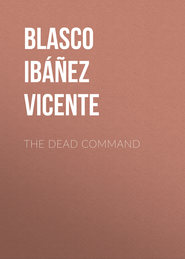По всем вопросам обращайтесь на: info@litportal.ru
(©) 2003-2024.
✖
The Enemies of Women (Los enemigos de la mujer)
Настройки чтения
Размер шрифта
Высота строк
Поля
When Alicia first met the Prince, on his return home, she burst out laughing, and almost embraced him.
"Do you remember how we used to hate each other? Do you remember that day in the Bois when we whipped each other?"
She looked at him with an air of interest, scrutinizing him from head to heel without detecting anything of the displeasing youth of former times. She knew of his adventures in Russia, his loves, his duels, his expulsion. An interesting man! A Byronic fellow! Besides, she had heard that he was a bit of a brute with women.
"Come and see me. We must be friends. Remember we are relatives."
Michael scrutinized her also, but with a certain seriousness. He had heard a great deal about her since arriving in Paris. During her three years of married life the Duke had tried twice to divorce her. It weighed on his mind to think that he should be enjoying immense wealth just in return for allowing her to bear his name. When he shook hands with a friend, he was never sure of the latter's relations with his wife. But Alicia had married the Duke in order to be a Duchess, and in the end the couple came to a practical agreement. Half of her income was to go to the Duke, who was to travel, or, if he wished, reside in Paris with a former mistress. Alicia might live as she pleased in her splendid white mansion in the Avenue du Bois de Boulogne, and display a ducal coronet on her underwear, on her silver, and on the doors of her motor cars.
The little horsewoman of the Mexican plains, trained to morning gallops, had been transformed into a woman of proud and arrogant beauty. To Michael she looked like a California orange, golden, gleaming, wafting a strong sweet fragrance.
Inwardly he winced at the gaze of those dark eyes, so enticing and fascinating, so provoking and commanding, in full consciousness of power.
But no. He remembered that various men whom he disliked, had, according to common gossip, already preceded him in falling under Alicia's spell. And for the time being he was interested in a French actress, whom he had met on the train returning from Russia.
Besides, he suddenly beheld her again in his imagination as she was years before. Perhaps she had not changed. She was used to managing men with a firm hand, to changing from one to another, as though they were post horses. He and Alicia would quarrel at their second meeting. They might easily end by coming to blows.
He saw no more of her. New preoccupations changed the direction of his thoughts. One day in the street he met a Russian who seemed old and ill. It was Sergueff, his former teacher. Sergueff must now have been some forty years of age. He looked as though he were in his seventies, with a dirty white beard, grayish skin, and a wrinkled almost motheaten face, with no sign of life save in the two green holes that marked his eyes. From Saint Petersburg they had sent him to a prison in Siberia. He had escaped, crossed half of Asia on foot and alone, as far as a Chinese seaport, and there he had taken ship for the United States. The story of this tour of the world was told in a few words, as though it were a single walk on the boulevards.
Michael Fedor took him to the palace. The Colonel seemed dismayed by Sergueff's presence, and drew back into his shell. He must remember his own connections with nobles of the Russian court! Some of them were former generals of police!
The son of Princess Lubimoff talked for several days with the fugitive. The memory of his own expulsion from the court caused Michael vaguely to sympathize with this man who was likewise an exile. Besides, in the depths of his mind something of his mother's character was stirring, with all its inconsistencies and hazy vague desires. The officer of the Guard listened as attentively as a scholar to the doctrines of the revolutionist.
"Why, those men are right!" he exclaimed with the passionate enthusiasm that the Princess herself expressed for every novelty.
For the first few days he felt a yearning for martyrdom, a deep desire for renunciation, the mystic abnegation of the man of his race. He thought of many princes like himself, educated at court, with high social positions, who had given away their wealth to live among the poor and dedicate their lives to the triumph of truth and justice. He would do the same. He would reawaken to true life, and he was sure that his mother would approve. General Saldaña had given his blood to rehabilitate the past; he would give his to overcome all obstacles in the pathway of the future. Times change. The past consists of a certain number of centuries; the future is infinite.
But Lubimoff was not a true Russian. No sooner had he decided to carry out his mystic determination, than the Latin love of pleasure reawakened in him. Life is good, and offers many pleasant things! For him the tree of life was still overflowing with sap; there still remained for him so many leafy springs, so many fruitful summers! Later, perhaps, when only the dry wood remained…
The one positive and immediate result of this resurrection was Michael's sense of his own ignorance and of the emptiness of his life. There was something in the world besides knowing languages, wielding rapiers, and riding horses. Man should seek the realization of his greatness in more serious enterprises than love making, duels and betting. Fate, in giving him wealth, had exempted him from the harsh necessity of work. But that was no reason why he should renounce making his mark in the world, as he passed through it, just as thousands of his predecessors had done, and as millions of men to come would continue to do.
For the first time in his life Michael sought the comradeship of books, and this initial reading stirred him with a new desire. He made up his mind to know the world, to see strange countries, to struggle with the blind forces, which form the pulsing of the planet, and to live the coarse rough adventures of men who go from port to port. His father had told him of remote ancestors of the Saldaña family, who had gained titles and fortunes by setting sail from humble Spanish harbors, swooping out like sea gulls across the gloomy Ocean, in the track of Columbus and the Pinzons, in search of new lands of mystery. An ancestor of his, disembarking with the aged Ponce de Leon in Florida, in search of the famous "Fountain of Youth," had been one of the discoverers of the present United States. The first Saldaña to be a noble had obtained his title of "don" by founding a city in the neighborhood of Panama. Why should he not be a navigator like his forebears, a wanderer of the seas, enjoying exotic pleasures, and perhaps succeeding in wresting some secret from the blue deep?
Life in that palace which his mother's mania had rendered ugly, was becoming uncomfortable and distasteful, and was impelling him to flee. The Princess did not make the slightest objection, when informed that her son desired to buy a yacht to navigate the seven seas. Let him do so, by all means! It was a princely pastime, quite worthy of a Prince Lubimoff. They were constantly growing richer. The oil, the platinum, all the precious ores of their properties and the products of their lands, as large as nations, made up an enormous income. The preceding year it had reached the sum of seventeen million francs: a million a month! For a single private family it meant unbelievable wealth, and the Princess Lubimoff, who had temporarily regained her sanity, modestly added:
"But for a queen it isn't much."
In England Michael purchased a sailing yacht, with a sharp bow, bold masts, and an auxiliary engine, and gave it the Spanish name for the sea gull, the "Gaviota."
His idea was to continue on the ocean the life he had led on land, selecting, however, only its most interesting phases. For that reason he decided to take Sergueff along. The teacher seemed melancholy, as though the comforts and the liberal sums of money which the Prince bestowed on him weighed on his conscience like remorse. He had something more urgent to do in the world than voyage idly hither and thither in a luxurious boat. He disappeared one day, to return to Russia, as though the gallows had a fascination for him. Or was it that he preferred, in case of better luck than that, to travel once again around the world, but in his own manner?
The Colonel, as the aide de camp of the Prince, felt obliged to embark. He had never yet left "his boy's" side! But, oh, he was not blessed with sea legs, and, much less, with a sea stomach! He was a hero of the mountains! They were obliged to send him back to Paris from a port in Brazil.
The voyage of the Gaviota lasted for five years. In the second year Michael Fedor thought his career as a navigator was about to be interrupted. The war between Russia and Japan had just broken out and he cabled from a Pacific port, asking for his former place in the Guard. The reply was a long time in coming. The Czar was still angry with him and kept him in exile.
"So much the better!" Michael finally said to himself in a voice choked with anger. He guessed what was going to happen; what was to be the final fate of those brave Russians of the sharp sabers, when they came to face the astute little yellow men who had silently gone on appropriating the most scientific occidental arts of killing.
His adventures in the various ports, his relations with women of every race and color, were sufficient to fill his life.
"I am studying geography," he wrote Don Marcos, after inquiring about his mother's health. "I am studying the geography of love."
It was not long before he was obliged to interrupt his cruise to return to the Princess. The physicians had ordered her away from the Paris palace, with its gloomy decorations so stimulating to her obsessions. They were sending her to the Riviera to drink sunlight and open air.
And poor Maria Stuart, absolutely incognito, went from one large hotel to another, occupying entire floors with her retinue of much beaten Russian servants and much adored soothsayers and witch doctors. She was the despair of the hotel keepers, who were always glad to see her depart, though she alone paid more than all the other guests put together.
Her son found her looking like a specter in her flowing mourning garb. She was weaker and thinner, and her eyes had taken on an alarming, fixed stare, which gave one the creeps. Her complexion had lost its former whiteness, gradually growing darker as though burned by an inner fire. For the moment her sole preoccupation was the construction of a palace on the Blue Coast. On French territory, in sight of Monte Carlo, she had bought a small promontory, a spur of land and rocks jutting out into the sea, a ridge covered with century-old olive trees and gnarled pines. She was kept busy quarreling with a stubborn old couple, an aged peasant and his wife, who were refusing to sell her the extreme point of the headland. She had already spent many thousands of francs on the plans of the future palace. Architects, painters, and landscape gardeners were constantly working for her, making studies of the historic past, in the endeavor to view of the Mediterranean an enormous Scottish castle express her imaginings. Her idea was to erect in full as Scotch as could possibly be imagined; in short, according to the Princess, it was to be "a novel of Walter Scott, done in stone."
Michael was frightened. The sumptuous dungeon in Paris was to be repeated in the face of that luminous sea, in one of the most smiling landscapes of the earth. Behind his mother's back he talked with all the men who were working on the future Villa Sirena, the "Villa of the Sirens." The Princess had selected this name, in the conviction that on moonlight nights the daughters of the briny deep would come and visit her, singing on the reefs beneath her window. That was the least they could do for her!
Each day the veil of mystery was opening more widely before her eyes, allowing her to see things which for others were invisible.
Don Marcos, who, deserted by his former pupil, had gone back to the Princess, likewise received instructions from Lubimoff. He was to prevent the unhappy lady from perpetrating such a sacrilege on the Mediterranean. But what could the poor Colonel do with that madwoman who spent whole weeks without speaking to him, as though she did not know who he was!
The Prince returned to his yacht, and a year later being by chance in upper Norway on his return from an expedition to the Arctic Ocean, he received the sad but expected news. His mother had died, just as she saw rising from among the olive trees and pines of the rosy promontory, the beginning of huge stone walls artificially blackened like the painted panels in the antique shops, and which looked as though they were about to fall in ruins from mere age, as soon as they had risen from the ground.
CHAPTER III
MICHAEL arrived in time to receive the body of the Princess in Paris. Before her death her mind had been illuminated by the sudden flare of reason which is the signal of the end in cases of serious mental disturbances. She had left various papers on which she had noted loans made to certain persons, and judicious suggestions for her son in regard to the management of the enormous fortune. She wanted to be buried beside her husband, her first husband, "the hero," in the Père Lachaise cemetery. During the last years she had stayed in Paris, she had been seized once more by the craze for building, and had busied herself with the preparation of her final dwelling place. Beside the mausoleum of the Marquis of Villablanca, whose image, frowning and indomitable, held in one hand a broken sword, she had set up another monument no less ostentatious with a statue which was supposed to be her exact likeness and was nothing less than the semblance of the unhappy Queen of Scots, as it appears in the engraving of the Romanticist period.
During the funeral ceremonies, Michael Fedor met again many persons who formerly visited the Lubimoff palace, and whom he had thought were dead. Doña Mercedes in tears embraced him. She had become extraordinarily stout, and the coppery complexion inherited from her Aztec ancestors had taken on an unhealthy ascetic pallor. She looked like the Mother Superior of a noble convent of nuns. At her side, Monsignor, in his silk cassock and with an air of compunction, was moving his lips to save the dead woman's soul. "My son! We have all our sorrows." And as she said this, the poor lady looked at another woman elegantly dressed in mourning who stood there somewhat aloof, in the cemetery, and seemed utterly incapacitated by the ceremony which had obliged her to rise before noon.
The Duchess de Delille also came forward to meet him, taking both his hands and giving him a strange glance.
"Your mother loved me … really loved me. During these last years we saw each other very often."
Michael nodded assent. He knew that already. The Princess Lubimoff had been the one loyal friend of this passionate unscrupulous woman, who was gradually losing every one's respect. She had defended Alicia when other high society women declared open war and closed their doors to her, fearing for their husbands' fidelity. As she used to play every winter at Monte Carlo, she had been in the company of the Princess up to the last moments.
"She loved me more than my mother ever did… Perhaps she remembered that I might have been her daughter."
The Prince walked away, as though annoyed by this allusion. He had heard such things about her!.. But all during the ceremony he kept seeing her in his mind's eye. She was still beautiful, but so strangely beautiful. Her skin had lost the golden tinge of ripened fruit, and now was pale, the dull white of Japanese paper. Her large eyes, which gave off green and yellow glints, stared with disturbing fixity and seemed at the same time to have a blank expression, as though covered by an invisible spider web. Her least bitter enemies accused her of a certain propensity for spirits. She drank all sorts of American mixed drinks like an habitué of the bars. Other people attributed her pallor and the continual darkly bewildered look in her eyes to morphine, opium and all the various liquids and perfumes producing lethargy and creating "artificial paradise." The little Alicia of former years was drinking, draining it to the last drop from the cup of life in deep draughts.
Michael Fedor thought that he had seen the last of her, but a few days later he began to receive letters. He was alone, and must be feeling sad, so she was inviting him to come and eat with her, informally, of course, as was natural among close relatives. His evasions brought fresh invitations by telephone. The Prince, like a person fulfulling a tiresome social obligation, finally went one evening to her little palace in the Avenue du Bois, one of the numerous imitations of the Petit Trianon, which are to be found in various parts of the world.
The Duchess de Delille was proud of this edifice and the tiny garden with its sharp, gilded grating, in front of which all fashionable Paris passed. Michael was acquainted with the drawing rooms without ever having been inside them. The illustrated journals, which cover the styles of wealthy social life, had published photographs, in Europe and America, of the interior of her residence. Gossip had kept him informed of Alicia's strange life. She had suddenly been taken with the mad desire of seeing people, of being admired, and of astonishing every one by her prodigality. She gave a series of great fêtes, and publicly protested because the municipality of Paris would not allow her to illuminate the entire Champs Élysées and the Arch of Triumph so that her guests might ride up to her very door in a fiery apotheosis. She had given a garden party in the Bois de Boulogne, with water sports, and dances of sacred dancers, brought from Asia. The buffet supper had been prepared for three thousand guests. On another occasion, for a single costume ball, she spent a hundred thousand francs, to transform part of her residence into an interior of Persian style and the next day she began to have the rooms restored to their original state.
Suddenly she would disappear, and people would wink and make malicious comments because she left no address. Some new love affair! Hers were nearly always wandering fancies, that called for long trips and new horizons! Perhaps she was in Constantinople or in Egypt; perhaps she was in hiding in one of the large New York hotels. At times such guesses were right; and then again the most intimate friends of the Duchess could affirm that she had not left Paris. Was not her automobile standing in front of the door?
This was another of Alicia's eccentricities. At all hours of the day and night, one of her various expensive cars was kept in readiness in front of the stairway. Three chauffeurs divided the service between them. They stayed in the porter's quarters; and as soon as the bell was heard, they had only to put on their gloves, run to the machine, and start the motor. She often chose the most extraordinary hours for going out. Sometimes it would be just after returning from a ball, then again she would get up for a ride after she had gone to bed. Frequently she would select the early morning hours which were usually her time of soundest sleep.
At times the chauffeurs would succeed each other, week after week, without leaving the gate of the mansion. The Duchess did not care to go out. She no longer felt her sudden impulses to ride aimlessly about Paris, while the city slept, pay unseasonable calls, or glide through the woods on the outskirts of the capital at the height of some violent storm. Meantime, the autos seemed to age, as they stood there motionless, now with their wheels deep in the snow of the courtyard, and again with the glass of the wind shield flecked with the tear drops of the slanting rain, that swept under the glass covered porte-cochère. During all such periods, Alicia, in spite of her restless impulsive nature, would be spending whole days in bed, telling her intimate friends that to keep one's beauty one must take a "rest cure" from time to time. She would entertain her friends at dinner without getting out of bed. The table would be spread in luxurious fashion in her large bedroom, and lying between the sheets, with the dishes within reach on a tiny table, she would laugh and chat for hours with her guests. Months would go by without her seeing the outside of her house, while the costly objects in her rooms, amassed to indulge her whims, were quite forgotten. Her vanity was satisfied, at such times, by the mere fact of having constructed a costly jewel case to harbor her idleness.
The Prince met her in a little reception room on the ground floor. She was in truth receiving him with absolute lack of ceremony. She was dressed in a black tunic of her own invention, a combination of the Greek peplum and the Japanese kimono. Her bare arms floated free from the soft silk that almost seemed to live, it clung so closely to her body. Underneath it, half revealed, were the contours and perfumed warmth of her flesh, hidden by no inner veils. Michael glanced at his tuxedo and gleaming shirt-front as though his own costume were quite out of place.
As she took him to the elevator, which was white and quilted like a glove box, he caught a rapid glimpse of the drawing rooms of the lower floor, ostentatious, but left in a shadow almost as dark as night; of the large dining-hall, deserted, with the furniture covered; of the little dining-room in which there were no signs whatsoever of preparations… Where was she taking him?.. Was the table set in her bedroom?
The elevator passed the second floor without stopping? "We are going to my study," said Alicia. "I eat there when I am alone."
The Prince was amazed at the so-called "study," a large room which occupied a major portion of the third floor, and in which only one or two books in a small book-rack were to be seen. The place was decorated in imitation "Far East" style: plain black lacquer furniture, silk either of pale shades or of an intense dark purple, and an array of frightful idols. A diffused bluish light, like that used in night scenes on the stage, descended from the ceiling. A screen, embroidered with a design in gold, formed a sort of second more intimate room, the floor of which was covered with white rugs of fur, with long, silky hair. Heaped about were dozens of pillows of various colors adorned with winged reptiles and unheard of flowers.















